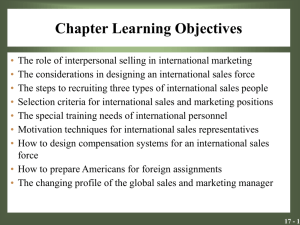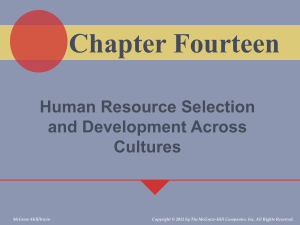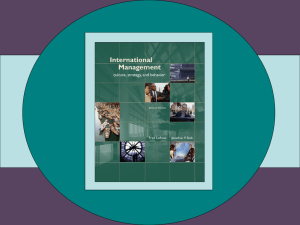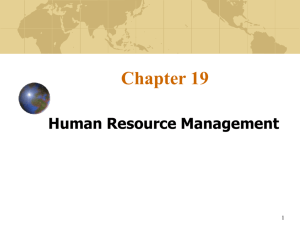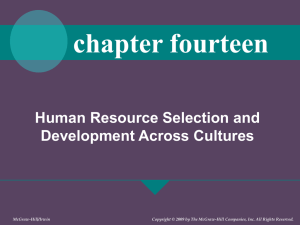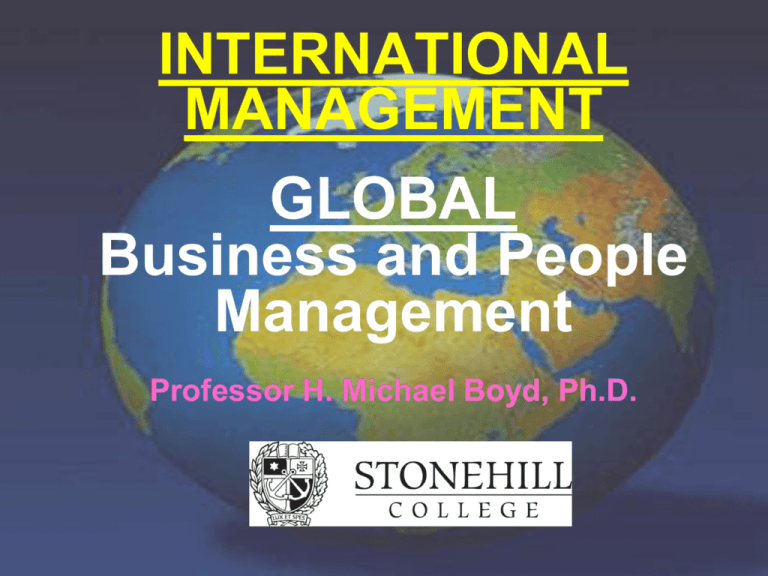
INTERNATIONAL
MANAGEMENT
GLOBAL
Business and People
Management
Professor H. Michael Boyd, Ph.D.
Professor H. Michael Boyd, Ph.D.
Chapter Fourteen
Human Resource Selection
and Development Across
Cultures
McGraw-Hill/Irwin
Copyright © 2012 by The McGraw-Hill Companies, Inc. All Rights Reserved.
The Importance of
International Human Resources
Human resources is an essential part of any
organization
It is important to understand how employees feel they
are being treated
The selection and development of human resources in
an international organization is especially challenging
Employees should be seen as critical resources
Sending employees overseas can be expensive
Economic pressures are changing the nature of the
human resources process
14-6
How Companies Are Responding
to the Economic Crisis
14-7
Sources of Human Resources
MNCs can use four basic sources for filling
overseas positions
1. Home-Country Nationals
Expatriate managers who are citizens of the
country where the multinational corporation is
headquartered
Sometimes called headquarters nationals or
expatriates
Common reasons to use home-country nationals
include to start up operations, to provide technical
expertise, to develop promising managers, and to
facilitate coordination and control
14-8
Sources for Human Resources
2.
Host-Country Nationals
Local managers hired by the MNC
Common reasons to use host country nationals
include
Familiarity with the culture
Knowledge of the language
They are less expensive than expatriates
Hiring them is good public relations
14-9
Sources for Human Resources
3.
Third-Country Nationals
Managers who are citizens of countries other than the
country in which the MNC is headquartered or the one in
which the managers are assigned to work by the MNC.
These managers are hired because they have the
necessary expertise for the job
Inpatriates
Individuals from a host country or third country who are
assigned to work in the home country.
Inpatriates can help MNCs develop their global
core competencies
MNCs can subcontract or outsource to take advantage
of lower human resource costs and increased flexibility
14-10
Selection Criteria for
International Assignments
International selection criteria
Factors used to choose personnel for international
assignments.
To assess the suitability of the manager’s
family for a foreign assignment may involve an
adaptability screening
The process of evaluating how well a family is likely
to stand up to the stress of overseas life.
14-11
Selection Criteria for
International Assignments
Adaptability
Education
Independence
Knowledge of local language
Self-reliance
Motivation
Physical & emotional health
Support of spouse & children
Age
Leadership
Experience
14-12
Reasons MNCs Look
Abroad for Workforce
14-13
Skills MNCs Seek
Within Countries
14-14
Rank of Criteria
in Expatriate Selection
14-15
Selection Criteria for
International Assignments
Adaptability to cultural change is essential for
expatriates
Research shows that that those who are best able to deal with
their new situation have developed coping strategies
characterized by socio-cultural and psychological adjustments
including
Feeling comfortable that their work challenges can be met
Being able to adjust to their new living conditions
Learning how to interact well with host-country nationals
outside of work
Feeling reasonably happy and being able to enjoy day-to-day
activities
14-16
Activities That Are Important
for Expatriate Spouses
14-17
Selection Criteria for
International Assignments
Applicants can better prepare themselves for
international assignments by preparing in
phases
Phase 1
Focus on self-evaluation and general awareness
include the following questions:
Is an international assignment really for me?
Does my spouse and family support the decision to go
international?
14-18
Selection Criteria for
International Assignments
Phase 2
Conduct a technical skills assessment
Do I have the technical skills required for the job?
Start learning the language, customs, and etiquette
of the region you will be posted
Develop an awareness of the culture and value
systems of the geographic area
Inform your superior of your interest in the
international assignment
14-19
Selection Criteria for
International Assignments
Phase 3
Attend training sessions provided by the company
Confer with colleagues who have had experience in
the assigned region
Speak with expatriates and foreign nationals about
the assigned country
Visit the host country with your spouse before the
formally scheduled departure if possible
14-20
Economic Pressures and Trends
in Expat Assignments
Despite the 2008-2010 economic recession,
most MNCs are still sending employees on
foreign assignments
This trend is driven in part by
Growth in emerging markets, especially in China
The continued integration of the European Union
The most common reason to turn down a
foreign assignment is family concerns followed
by spousal career concerns
14-21
International Human Resource
Selection Procedures
Anticipatory Adjustment
Training
Previous experience
In-country Adjustment
Individual’s ability to adjust effectively
Ability to maintain a positive outlook, interact well with host nationals,
and to perceive and evaluate the host country’s cultural values and
norms correctly
Clarity of expatriate’s role in the host management team
Expatriate’s adjustment to the organizational culture
Non-work matters
14-22
The Relocation Transition Curve
14-23
Relative Cost of Living
in Selected Cities
14-24
Firing Employees
H. Michael Boyd, Ph.D.
25
14-25
European Labor Cost
H. Michael Boyd, Ph.D.
26
14-26
Compensation
Common elements of compensation packages
1.
Base salary
Amount of money that an expatriate normally receives in the
home country
2. Benefits
Should host-country legislation regarding termination of
employment affect employee benefits entitlements?
Is the home or host country responsible for the expatriates’
social security benefits?
Should benefits be subject to the requirements of the home
or host country?
Which country should pay for the benefits?
Should other benefits be used to offset any shortfall in
coverage?
Should home-country benefits programs be available to local
nationals?
14-27
Compensation
3. Allowances
Cost-of-Living Allowance
Payment for differences between the home country and
the overseas assignment.
Designed to provide the expatriate the same standard of
living enjoyed in the home country
May cover a variety of expenses, including
relocation, housing, education, and hardship
Incentives
A growing number of firms have replaced the ongoing
premium for overseas assignments with a one-time,
lump-sum premium
14-28
Compensation
4. Taxes
Tax equalization
An expatriate may have two tax bills for the same
pay
Host country
U.S. Internal Revenue Service
MNCs usually pay the extra tax burden
14-29
Employer Incentive Practices
Around the World
14-30
Compensation
Tailoring the compensation package
Balance-sheet approach
Ensure the expatriate doesn’t lose money on the assignment
Complementary approach
Negotiate to work out an acceptable ad hoc arrangement
Localization
Pays the expatriate a salary comparable to local nationals
Lump sum method
Gives the expatriate a lump sum of money
Cafeteria approach
Gives the individual a series of options
Regional system
Sets a compensation system for all expatriates who are
assigned to a particular region
14-31
Individual and Host Country
Viewpoints
Candidate motivations
Why do individuals accept foreign assignments?
Greater demand for their talents abroad than at
home
Host-country desires
Whom would it like to see put in managerial
positions?
Host countries prefer a managerial style similar to
that of their country
14-32
Repatriation of Expatriates
Repatriation
The return to one’s home country from an overseas
assignment.
Reasons for returning to home country
The agreed-on tour of duty is over
Want their children educated in a home-country school
Not happy in their overseas assignment
Failed to do a good job
Readjustment problems
“Out of sight, out of mind” syndrome
Organizational changes
Technological advances
Adjusting to the new job back home
14-33
Repatriation of Expatriates
Transition strategies
Repatriation agreements
Firm agrees with individual how long she or he will be
posted overseas and promises to give the individual, on
return, a job that is mutually acceptable.
Some of the main problems of repatriation include
Adjusting to life back home
Facing a financial package that is not as good as that
overseas
Having less autonomy in the stateside job than in the
overseas position
Not receiving any career counseling from the company
14-34
Human Resource Management
Practices in Select Countries
14-35
Training in
International Management
Training
The process of altering employee behavior and
attitudes in a way that increases the probability of
goal attainment.
There are four management philosophies on
training
1. Ethnocentric MNC
Stresses nationalism and often puts home-office people
in charge of key international management positions.
14-36
Training in
International Management
2. Polycentric MNC
Places local nationals in key positions and allows these
managers to appoint and develop their own people.
3. Regiocentric MNC
Relies on local managers from a particular geographic
region to handle operations in and around that area.
4. Geocentric MNC
Seeks to integrate diverse regions of the world through
a global approach to decision making.
14-37
Training in
International Management
Reasons for Training
Organizational reasons
Ethnocentrism
The belief that one’s own way of doing things is superior to
that of others.
To improve communication flows
To increase overall efficiency and profitability
Personal reasons
To train overseas managers to improve their ability to interact
effectively with local people in general and with their
personnel in particular
Increasing numbers of training programs address social topics
– these programs also focus on dispelling myths and
stereotypes by replacing them with facts about the culture
14-38
Types of Training Programs
Standardized vs. tailor-made
Small firms usually rely on standard training programs
Larger firms tend to design their own
Tailor-made programs are designed for the specific
needs of the participants
Cultural assimilator
Programmed learning techniques designed to
expose members of one culture to some of the
basic concepts, attitudes, role perceptions,
customs, and values of another culture.
14-39
Types of Training Programs
Positive organizational behavior (POB)
The study and application of positively oriented
human resource strengths and psychological
capacities that can be measured, developed, and
effectively managed for performance improvement
in today’s workplace.
Positivity in the workplace has been linked to
employee satisfaction
Positive organizations try to match employee skills
and talents with organizational goals and
expectations
14-40
Future Trends
A critical issue for international human
resources in the coming decades is linking
talent management and employee mobility
Another issue is the emergence of crossborder commuters
A third issue is the rise and growth of
emerging markets
14-41
Group Exercise:
The EXPATRIATE
You are an American Executive in the
computer industry.
You currently manage a manufacturing
division for the company in Santa Clara,
California, USA. The division has 1000
employees.
You have been offered the opportunity to
manage the company’s manufacturing division
in Seoul, South Korea. That division also has
1000 employees.
14-43
This is a career development opportunity that you
want. It will enhance your experience and future
career growth.
The company expatriate policy is to select people
for foreign assignments that understand the people
managing differences required for success; and to
financially, and in lifestyle keep them whole while
maintaining competitive compensation and lifestyle.
You must describe the key cultural differences
between the United States and Korea; and:
List how each cultural difference will require a
different treatment of employees (U.S. versus
Korea)
14-44
What are the key cultural
differences in South Korea?
Cultural Factor:
The United
States:
Seoul:
RELIGION
Education
Economics
Politics
Family
Class Structure
Languages
History
Natural Resources/
Geography
14-45
How will you have to manage differently
because of those differences?
1.
2.
3.
4.
5.
6.
7.
.
.
.
.
.
.
.
14-46
COMPENSATION
The company has asked how you should be
compensated in order to make sure you are
kept “whole” and that your compensation is
competitive.
You must present a rationale and specific
amounts and items that you believe you
should receive
14-47
Total Compensation Comparison
Item
US—Your current cost
What you should get in
Seoul
Base Salary
Bonus / Incentive Pay /
stock
Health care
Pension plans
Vacation
Personal time off
Recreation/health
Housing
Transportation
Living Expenses
14-48
INTERNATIONAL MANAGEMENT -- GROUP EXERCISE.
TOTAL COMPENSATION FOR EXPATRIOT EMPLOYEE in KOREA:
Total Compensation for employee if based in the U.S. :
Direct payments
$0
$0
U.S
Korea
$0
$0
Korea
Support for Adjustment at Foreign Assignment
Base Salary (annual - in U.S.)
Home Leave (every 4-8 weeks)
Annual Bonus (in U.S)
Personal Security
Incentive pay / Stock / etc.
Car / Driver
Pension plans
Domestic Help
Vacation
Spouse Employment
Personal time off
Child care Provider
Recreation/health
Language / translation services
Housing
Cultural training
Transportation
Repatriation assistance
Health care
Social Club fees
Tax Reduction / equalization
Imported food and other goods
$0
Home Furnishing Allaowance
Education Allowance
Hardship Premium
Goods and services Differential
Temporary Living Allowance
Assignment completion bonus
Extension Bonus
Help Renting U.S. Home
14-49
14-50

